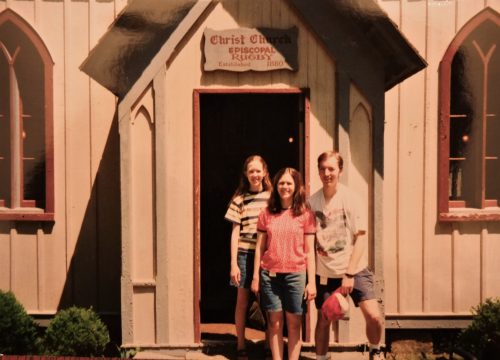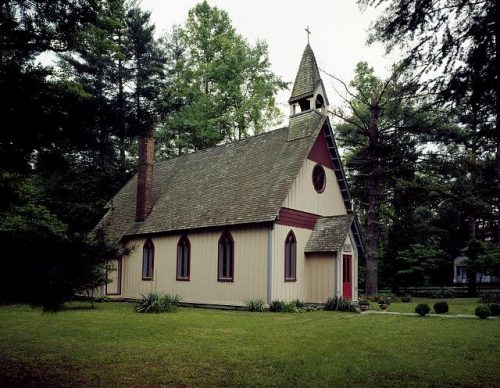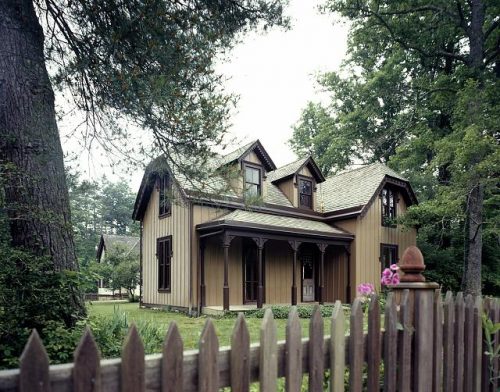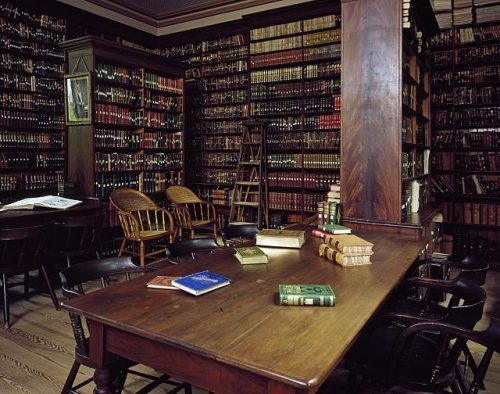Learning to Work Hard
Our family has enjoyed visiting the Victorian village of Historic Rugby, located in rural East Tennessee. Here are our children John, Bethany, and Mary Evelyn on one of our field trips there many moons ago.

In the photo, our children are standing in front of Rugby’s original church, built in 1880.

Historic Rugby was a utopian community based on ideas of English author and social reformer Thomas Hughes. Hughes was a lawyer who had become famous in England and America after publishing Tom Brown’s School Days in 1857. He based the novel partly on his experiences at the famous English school for boys, called Rugby.
When Thomas Hughes visited the United States in 1870, he noticed that young American men moved easily from school to work in a variety of fields, while schools for upper class English boys prepared them for only a few professions. If a young Englishman entered a profession other than one of those chosen few, his work was considered to be beneath him.
Hughes became interested in the idea of a community where everyone was equal. Around 1879 Hughes joined with wealthy Englishmen and Boston businessmen to establish the utopian community of Rugby where blacks and whites, Englishmen and Americans could live and work together. Rugby would be a place where people who had been enemies in the Revolutionary War and the American Civil War would join together.
The town of Rugby opened officially on October 5, 1880. By then the community had a few homes, an inn, and the Episcopal church pictured above. Americans in distant places followed news stories about this utopian community on the Cumberland Plateau in East Tennessee.
It wasn’t long until boarding houses, more homes, and the Hughes Free Public Library opened.

Publishers from around the country sent first editions for the library.

The population reached around 300 in 1881. Northern Americans, southern Americans, and a few immigrants from England, France, and Germany joined the Tennesseans already living in the area. The English immigrants included some of those upper class Englishmen Hughes thought about when he visited America in 1870. Hughes never moved to Rugby himself. However, his mother and brother became residents and Hughes visited most years through 1887.
Rugby was one of several utopian communities begun in the United States and, like almost all of those other communities, it started off well and then deteriorated over time. Ray and I have visited utopian communities in Indiana, Kentucky, Iowa, and this one in Tennessee. From what we have seen, I believe that God is the only One Who can establish utopia, and that utopia is the one Jesus talked about shortly before His crucifixion and resurrection:
In My Father’s house are many dwelling places;
if it were not so, I would have told you;
for I go to prepare a place for you.
John 14:2
In 1892, Thomas Hughes wrote a letter to a Rugby resident, stating “that good seed was sown when Rugby was founded and that someday the reapers will come along with joy, bearing heavy sheaves with them,” a reference to this Bible passage:
Those who sow in tears shall reap with joyful shouting.
He who goes to and fro weeping, carrying his bag of seed,
Shall indeed come again with a shout of joy, bringing his sheaves with him.
Psalm 126:5-6
In 1966 a small group formed the Rugby Restoration Association. They have been able to restore the church, library, and many of the buildings that were still standing. Tourists now come to Rugby to learn about this experiment with utopia on the Cumberland Plateau of Tennessee. One lesson they learn there is that achievement takes hard work. Another lesson they learn is that people shouldn’t view hard work as beneath them.
As a homeschooling mama you have an important opportunity to teach your children a different lesson from the one those upper class English boys learned in their schools. Teaching your children to work hard at whatever their hands find to do is an important component of every child’s education.
He who tills his land will have plenty of bread,
But he who pursues worthless things lacks sense.
Proverbs 12:11
In all labor there is profit,
But mere talk leads only to poverty.
Proverbs 14:23
He also who is slack in his work
Is brother to him who destroys.
Proverbs 18:9

